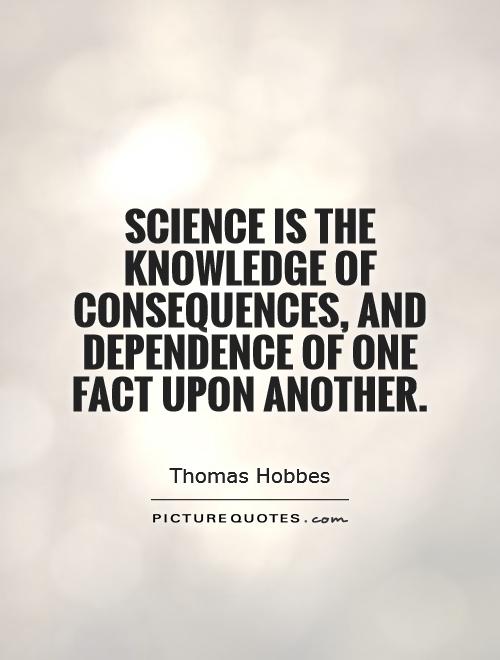Science is the knowledge of consequences, and dependence of one fact upon another

Science is the knowledge of consequences, and dependence of one fact upon another
Thomas Hobbes, a prominent English philosopher of the 17th century, is often associated with his contributions to political theory and social contract theory. However, his views on science and the nature of knowledge are equally significant. In his work, Hobbes emphasized the importance of understanding the consequences and dependencies of facts in order to acquire true knowledge.Hobbes believed that science is the knowledge of consequences, and dependence of one fact upon another. This statement reflects his empiricist approach to understanding the world. According to Hobbes, knowledge is derived from sensory experience and observation of the natural world. By examining the relationships between different facts and phenomena, one can uncover the underlying principles that govern the universe.
For Hobbes, science is not simply a collection of isolated facts or observations. Instead, it is a systematic and interconnected body of knowledge that reveals the causal relationships between different phenomena. By understanding how one fact depends on another, scientists can uncover the underlying laws and principles that govern the natural world.
Hobbes' emphasis on the importance of consequences and dependencies in science can be seen in his approach to philosophy. In his famous work, Leviathan, Hobbes sought to establish a systematic and rational foundation for political theory. By examining the consequences of human behavior and the dependencies between individuals in society, Hobbes developed a theory of social contract that emphasized the need for a strong central authority to maintain order and prevent chaos.












 Friendship Quotes
Friendship Quotes Love Quotes
Love Quotes Life Quotes
Life Quotes Funny Quotes
Funny Quotes Motivational Quotes
Motivational Quotes Inspirational Quotes
Inspirational Quotes